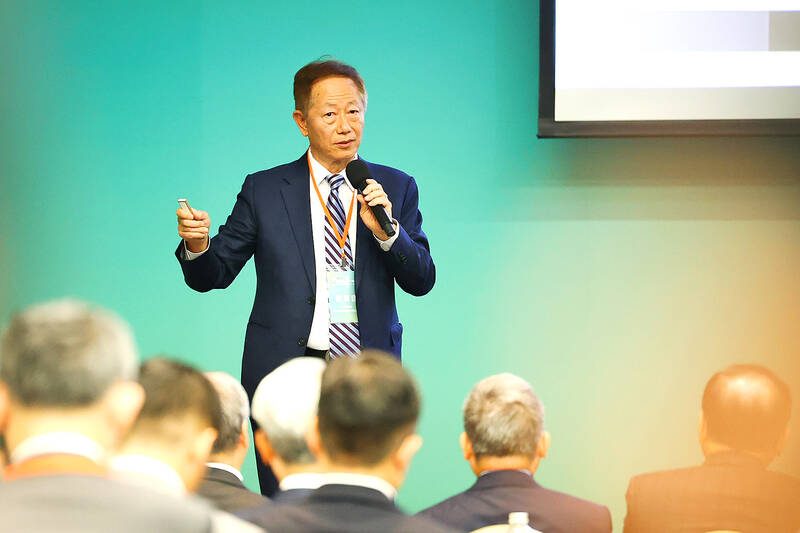Former Taiwan Semiconductor Manufacturing Co (TSMC, 台積電) chairman Mark Liu (劉德音) yesterday warned against the tendency to label stakeholders as either “pro-China” or “pro-US,” calling such rigid thinking a “trap” that could impede policy discussions.
Liu, an adviser to the Cabinet’s Economic Development Committee, made the comments in his keynote speech at the committee’s first advisers’ meeting.
Speaking in front of Premier Cho Jung-tai (卓榮泰), National Development Council (NDC) Minister Paul Liu (劉鏡清) and other officials, Liu urged the public to be wary of falling into the “trap” of categorizing people involved in discussions into either the “pro-China” or “pro-US” camp.

Photo: CNA
Liu, who stepped down in June after six years as TSMC chairman, did not mention specific instances, saying only that this tendency would hinder “imagination” and “curiosity” in discussions.
He cited the US as an example and said policy discussions had been dominated by either the “pro-Trump” or “anti-Trump” camp — referring to former US president Donald Trump, who is seeking a return to the White House in this year’s election — often seeking to prioritize its agenda above all else.
Instead, he called for the elimination of binary thinking and for bringing together every stakeholder in society to help “make Taiwan strong.”
Taiwan needs to scramble to confront its economic disadvantages, particularly its limited market size, he said.
If a company does not see the entire world as a potential market, it will sooner or later find itself “confined” to the domestic market, Liu said.
While such a business strategy might still make company executives wealthy, its positive impact on Taiwan’s economy might not be long-lasting, he said.
“Taiwan needs to identify opportunities where it can contribute to global market growth,” Liu said, adding that Taiwan’s next key industry would be determined by whether it has the potential to become a global supplier.
With that in mind, the government must focus its resources on developing and supporting “ecosystems” for industries where Taiwan has a competitive advantage in producing high-value-added goods to help capture the global market, he said.
Liu specifically mentioned the boom in the data center industry, which he described as “a gift suddenly falling from the sky,” likely alluding to recent plans by foreign tech giants, including Google, Amazon Web Services and Nvidia Corp, to build such centers in Taiwan.
Taiwan has to seize the opportunity to develop the “cooling system,” a critical part of a data center, he said, adding that having an edge in that realm would make Taiwan indispensable to the global community.
Established in July, the Executive Yuan’s Economic Development Committee has been described by Cho as a task force responsible for formulating policies and addressing various economic issues.
Apart from Liu, the commission includes nearly 60 representatives from enterprises, business associations and academia who serve as advisers.

The US dollar was trading at NT$29.7 at 10am today on the Taipei Foreign Exchange, as the New Taiwan dollar gained NT$1.364 from the previous close last week. The NT dollar continued to rise today, after surging 3.07 percent on Friday. After opening at NT$30.91, the NT dollar gained more than NT$1 in just 15 minutes, briefly passing the NT$30 mark. Before the US Department of the Treasury's semi-annual currency report came out, expectations that the NT dollar would keep rising were already building. The NT dollar on Friday closed at NT$31.064, up by NT$0.953 — a 3.07 percent single-day gain. Today,

‘SHORT TERM’: The local currency would likely remain strong in the near term, driven by anticipated US trade pressure, capital inflows and expectations of a US Fed rate cut The US dollar is expected to fall below NT$30 in the near term, as traders anticipate increased pressure from Washington for Taiwan to allow the New Taiwan dollar to appreciate, Cathay United Bank (國泰世華銀行) chief economist Lin Chi-chao (林啟超) said. Following a sharp drop in the greenback against the NT dollar on Friday, Lin told the Central News Agency that the local currency is likely to remain strong in the short term, driven in part by market psychology surrounding anticipated US policy pressure. On Friday, the US dollar fell NT$0.953, or 3.07 percent, closing at NT$31.064 — its lowest level since Jan.

The New Taiwan dollar and Taiwanese stocks surged on signs that trade tensions between the world’s top two economies might start easing and as US tech earnings boosted the outlook of the nation’s semiconductor exports. The NT dollar strengthened as much as 3.8 percent versus the US dollar to 30.815, the biggest intraday gain since January 2011, closing at NT$31.064. The benchmark TAIEX jumped 2.73 percent to outperform the region’s equity gauges. Outlook for global trade improved after China said it is assessing possible trade talks with the US, providing a boost for the nation’s currency and shares. As the NT dollar

The Financial Supervisory Commission (FSC) yesterday met with some of the nation’s largest insurance companies as a skyrocketing New Taiwan dollar piles pressure on their hundreds of billions of dollars in US bond investments. The commission has asked some life insurance firms, among the biggest Asian holders of US debt, to discuss how the rapidly strengthening NT dollar has impacted their operations, people familiar with the matter said. The meeting took place as the NT dollar jumped as much as 5 percent yesterday, its biggest intraday gain in more than three decades. The local currency surged as exporters rushed to